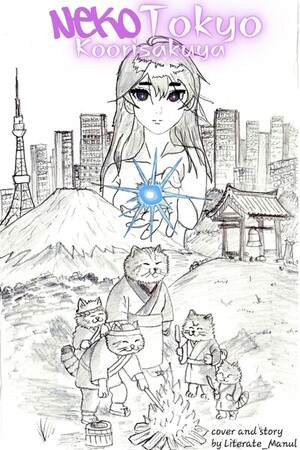Chapter 36:
Earthly Magic
Earthly Solutions
The most remarkable thing about Selena's adaptation to Earth wasn't her revolutionary metallurgical innovations or her systematic transformation of industrial manufacturing processes. It was how she managed to bring just a hint of magic back with her without anyone realizing that's what it was.
"Hiroshi," she said one evening, showing me the latest technical specifications for what appeared to be an impossibly efficient alloy production process, "I think I've successfully adapted the enhancement techniques I developed in the fantasy world to Earth's industrial capabilities."
"How so?"
"The magical enhancement methods I used there weren't actually dependent on magic," she explained, pulling out what appeared to be a comprehensive technical manual. "They were dependent on systematic understanding of material properties, precise environmental control, and what I now realize were advanced applications of quantum mechanics that your world's science is just beginning to understand."
I examined her technical documentation, which described manufacturing processes that achieved results that should have been impossible using conventional Earth technology.
"These efficiency ratings…" I said, reviewing her performance data, "are significantly higher than anything currently available in industrial metallurgy."
"Because I'm applying principles that combine advanced materials science with systematic optimization techniques that don't exist in your world's current manufacturing framework," she said with satisfaction. "It's not magic, it's just a more comprehensive understanding of how materials actually behave at the molecular level."
Over the past year, Selena's consulting firm had become one of the most successful advanced materials companies in the world, primarily because her "innovative approaches" to metallurgical engineering consistently produced results that exceeded all existing performance standards.
But what made her success particularly remarkable was how she'd managed to implement her fantasy world optimization principles within Earth's much more regulated and systematic business environment.
"The quality control methodologies we developed for our original consulting firm," she explained during one of our business review meetings, "translate perfectly to Earth's industrial applications. The same systematic approaches that helped adventurers optimize their equipment management help manufacturers optimize their production efficiency."
"And the systematic transparency and documentation standards?"
"Even more valuable here than they were in the fantasy world," she said. "Earth's regulatory environment actually rewards the kind of comprehensive compliance and systematic process management that we developed to compete with institutional corruption."
Selena's success had created opportunities for me to apply our optimization techniques to Earth's corporate consulting sector, where systematic approaches to financial management and operational efficiency were apparently much more valued than they had been in our original corporate positions.
"Mr. Yamamoto," said the CEO of Global Industries Inc. during one of our corporate optimization consultations, "your systematic approach to financial management has improved our operational efficiency by 34 percent while reducing our administrative overhead by 22 percent."
"Those results are consistent with the optimization principles we've developed," I replied, noting how much more straightforward corporate consulting was on Earth compared to navigating fantasy world guild politics. "Systematic approaches to complex challenges consistently produce superior results regardless of the specific industry or technological framework."
"And your documentation standards have revolutionized our compliance procedures. We've never had financial records this comprehensive or this easily accessible."
What he didn't know was that our "innovative" documentation standards were actually just the basic filing systems Mr. Tanaka had developed to manage medieval adventure parties and magical equipment depreciation schedules.
"Furthermore," the CEO continued, "your approach to systematic reform has enabled organizational improvements that we didn't know were possible. You've essentially created a new paradigm for corporate efficiency optimization."
I had to suppress a smile. Our "new paradigm" was just the application of basic competence and systematic attention to detail that we'd learned from trying to help fantasy adventurers manage their monster-hunting expenses.
"The principles of systematic optimization are universal," I said. "They work equally well for managing spell component inventories and corporate supply chains, for optimizing dungeon expedition planning and industrial production scheduling."
What made our Earth success particularly satisfying was discovering that the meaningful work we'd found in the fantasy world was also available here—we'd just been working for the wrong companies and applying our skills to the wrong problems.
"Selena," I said one evening as we reviewed our combined business performance, "I think we've proven something important about the nature of meaningful work."
"What's that?"
"That professional fulfillment isn't dependent on the specific world or technological environment you're working in," I said. "It's dependent on finding problems worth solving and applying systematic competence to achieve results that genuinely benefit people."
"Plus," she added, "we've demonstrated that the optimization principles we developed in the fantasy world are genuinely universal. They work just as well for Earth's advanced technology as they did for medieval economics and magical equipment management."
Our success had also attracted attention from academic and research institutions that were interested in understanding our "innovative methodologies" for systematic optimization and institutional reform.
"Dr. Yamamoto, Dr. Brightforge," said the Research Director from the Boston Business Innovation Lab during one of our consulting presentations, "your systematic approaches to organizational efficiency represent paradigm shifts in multiple fields simultaneously. We'd like to collaborate on research that could formalize these methodologies for broader academic and industrial application."
"We'd be interested in that collaboration," Selena replied. "Particularly research that explores the universal principles underlying systematic optimization across different technological and economic frameworks."
What the research director didn't know was that our "paradigm shifts" were just the practical applications of lessons we'd learned from helping fantasy adventurers avoid being financially destroyed by poor equipment procurement decisions and magical spell component cost overruns.
But perhaps the most satisfying aspect of our Earth success was the regular correspondence we maintained with Mr. Tanaka, whose institutional reform projects in the fantasy world were apparently proceeding with characteristic systematic precision.
His latest report had included documentation of comprehensive financial management reforms across three separate kingdoms, the establishment of standardized accounting procedures for magical equipment and spell component transactions, and the successful implementation of systematic transparency protocols that had eliminated institutional corruption across multiple governmental and commercial organizations.
"Yamamoto, Selena—your success in applying our methodologies to Earth's technological environment validates everything we learned about the universal applicability of systematic competence and professional excellence. Meaningful work really is achievable anywhere that problems exist and competence is valued over compliance."
"My institutional reform projects here have expanded beyond anything we originally projected. The systematic optimization principles we developed for individual clients are now being implemented across entire governmental and commercial frameworks. I've been appointed as the Royal Director of Administrative Modernization, with authority to implement systematic reforms across all institutional operations within the kingdom."
"More importantly, the community of professional excellence we accidentally created around our original consulting firm has become a permanent feature of this world's economic and political structure. Systematic competence and transparent business practices are no longer just innovative approaches—they're established standards that everyone else has to meet."
The most remarkable thing about our interdimensional business adventure was how it had created three separate but connected success stories across two different worlds, all based on the same fundamental principles: systematic competence, professional excellence, and the belief that meaningful work was worth pursuing regardless of personal cost or convenience.
"Hiroshi," Selena said one evening as we prepared for another corporate optimization consultation, "do you ever miss the fantasy world?"
"I miss working with Mr. Tanaka," I admitted. "But I don't miss the world itself. The meaningful work, the professional satisfaction, the sense of making a genuine difference, all that is available here too, once you know how to find it."
"And the magic?"
I looked around our apartment, noting Selena's advanced metallurgical equipment that achieved impossible results through systematic application of principles that Earth's science was only beginning to understand. I thought about our consulting firm that was revolutionizing corporate efficiency through techniques developed for managing medieval adventure economics. I considered our success in applying fantasy world optimization methods to solve Earth's industrial and business challenges.
"The magic," I said, "was never about the spells or the magical equipment. It was about discovering that systematic competence could solve any problem, that professional excellence was universally valuable, and that meaningful work was achievable anywhere people were willing to apply genuine skill to genuine challenges."
"So, we brought the real magic back with us?"
"We brought back the knowledge that competence and systematic optimization are universal principles that create value wherever they're properly applied," I corrected. "And the understanding that meaningful work isn't dependent on magical environments, it's dependent on finding problems worth solving and having the professional skills to solve them effectively."
As we headed out for our consultation about what would probably become another success story in systematic corporate optimization, I reflected on how our interdimensional adventure had taught us something important about the nature of professional fulfillment.
It wasn't about the specific world you worked in, the technology you used, or even the problems you solved. It was about applying systematic competence to challenges that mattered, working with people who shared your values, and creating results that made a genuine difference in the world around you.
That kind of magic was available in any dimension.




Please sign in to leave a comment.